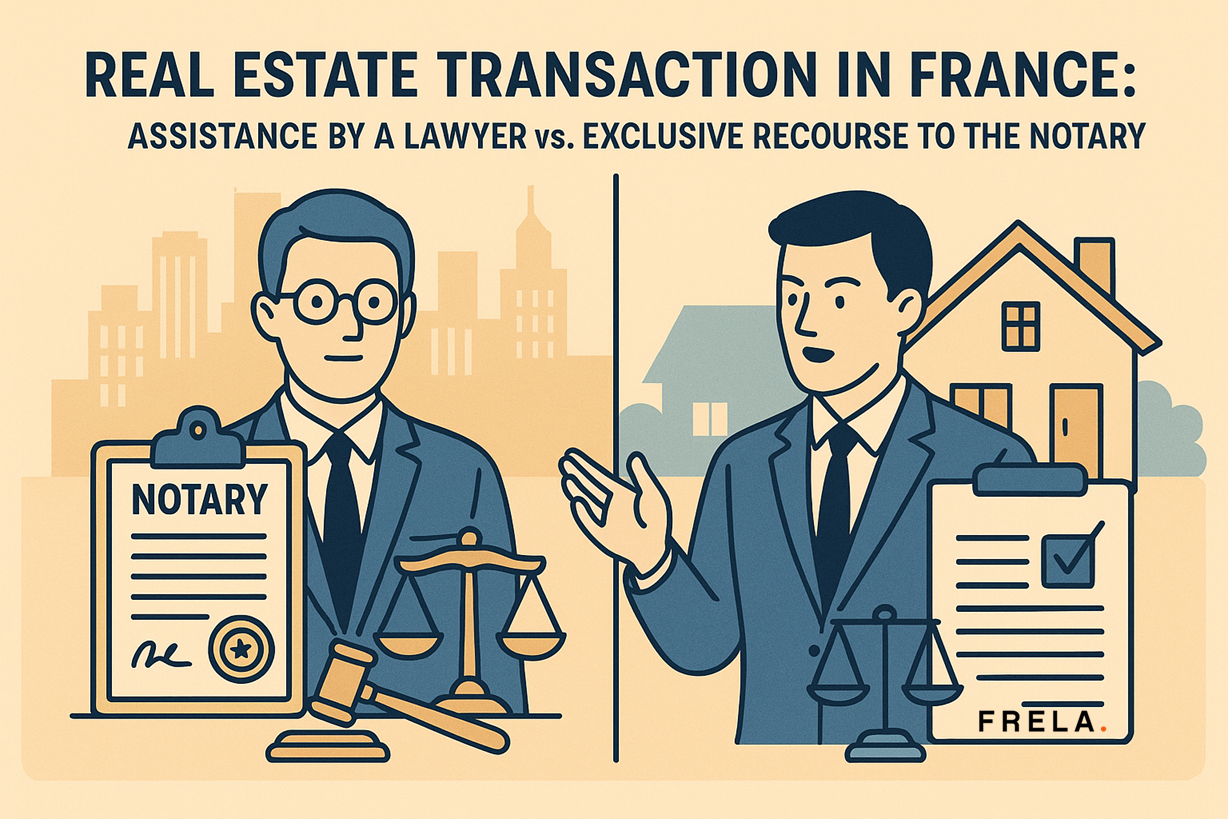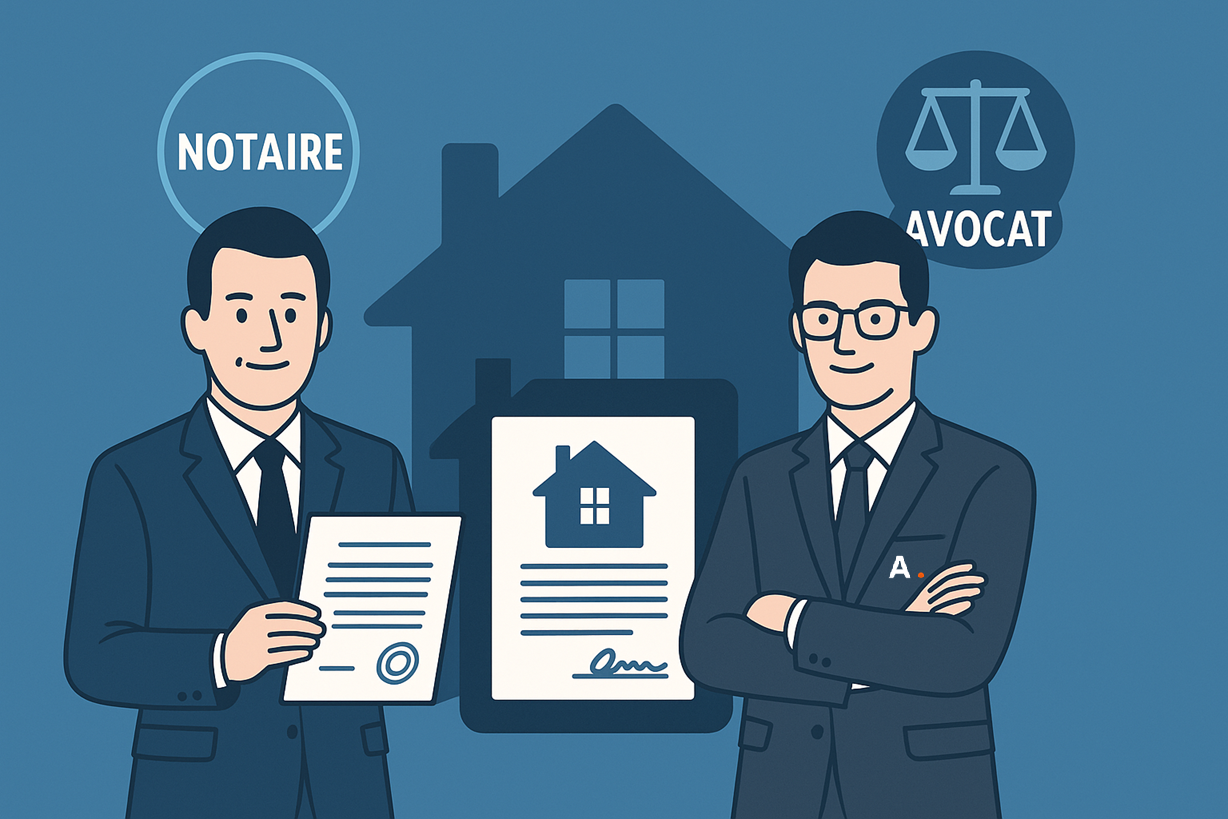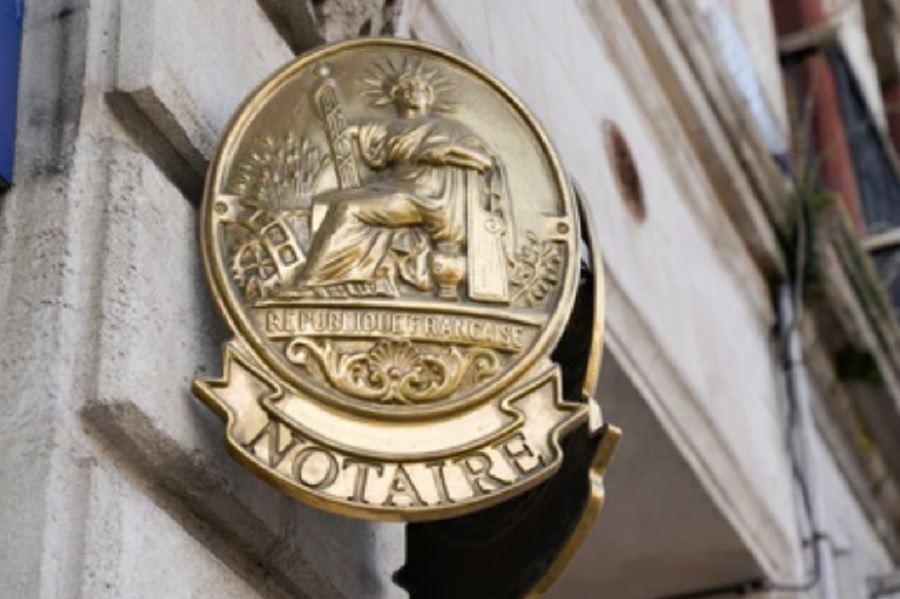Real estate transaction in France : assistance by a lawyer vs. exclusive recourse to the notary
In France, the intervention of a notary is mandatory to conclude the real estate sale (authentic deed). However, this does not mean that the notary is sufficient to protect all the interests of a non-resident seller, especially in complex or high-stakes transactions. Calling on a lawyer in addition to (or upstream) the notary’s action has significant advantages, especially for a demanding international public.


Respective roles of the notary and the lawyer:
The notary is an impartial public officer: he prepares and authenticates the deed, he advises both parties on compliance with the law and ensures the formal legal security of the transaction. However, the notary is not the particular defender of the seller or the buyer; he must watch over the interests of all and regularity, without favouring one or the other. Conversely, the lawyer is the dedicated counsel of his client (in this case, the non-resident seller). He intervenes upstream to secure the seller’s interests exclusively, negotiate the contractual terms in his favour, and possibly manage aspects outside the scope of the notary (for example, optimising the seller’s taxation, advising on the structure of the operation, etc.). An international real estate lawyer understands the client’s wealth objectives, is proficient in both legal systems (client’s country and France) and often speaks the client’s language, which avoids misunderstandings.
Assistance at all stages:
A lawyer can accompany the seller at each stage of the sale. For example, when putting the seller up for sale, the lawyer can check or draft the sales mandate with the agency to ensure that the clauses protect the seller (no excessive commission, fair termination terms, etc.). At the negotiation stage, the lawyer can process the purchase offers received, draft or check the sales agreement. He ensures that all the necessary conditions precedent are present to protect the seller (for example, requiring proof of financing from the buyer within a short period of time, limiting the period of validity of the conditions, strictly regulating withdrawal clauses). He can add specific clauses serving the seller’s interest, whether on the terms of payment, the deadlines for releasing the property, or the insertion of a penalty clause in the event of the buyer’s delay. The notary, on the other hand, often drafts a standard compromise: having your own lawyer allows you to personalise the contract. During the interval between the preliminary agreement and the sale, the lawyer follows the case, follows up with the parties if necessary, and above all checks the draft notarial deed. Indeed, even the authentic deed may contain clauses to be discussed: for example, the seller’s declarations and warranties. The lawyer makes sure that the deed mentions a clause exempting the seller from the warranty of latent defects (style clause, but essential), that the description of the property is correct, that any easements are listed, etc. He may correct or complete the deed in the interest of his client.
Enhanced legal certainty:
An experienced real estate lawyer guarantees the legal security of the transaction beyond the strict formalism. For example, faced with the increasing complexity of mandatory documents and regulations (urban planning, diagnostics, taxation), he ensures that the seller’s file is complete and that nothing is forgotten (which could otherwise cause later disputes). A notary also carries out these checks, but a lawyer doubles the control and does so with a view to protecting his client from any recourse. If a point of legal friction arises (e.g., the diagnosis reveals a problem, the urban planning certificate indicates a non-conformity), the lawyer advises the seller on the course of action to be taken (disclosure, corrective work, negotiation of a limited warranty clause, etc.). In addition, the lawyer anticipates possible disputes: he knows that a poorly put together sale can lead to a lawsuit where the buyer asks for compensation, a price reduction, or even the cancellation of the sale. Its intervention aims to eliminate these risks (e.g. providing all the information to avoid fraud, inserting clear waivers from the buyer on certain points, etc.).
Tax and international advice:
A French notary knows the local taxation of the sale (capital gains, etc.) and will give basic advice, but a tax lawyer can go further by proposing personalized optimization schemes (such as those mentioned above: dismemberment, donation, etc.). Above all, he will be able to coordinate the situation with the seller’s country of residence (for example, how will the proceeds of the sale abroad be treated, should it be repatriated, are there local reporting obligations, etc.). The multijurisdictional aspect is crucial for an expatriate: an international lawyer accustomed to these transactions will know how to navigate the different jurisdictions and avoid the multicultural traps. For example, the deadlines and practices are not the same from one country to another: a lawyer may explain to the foreign client how France works (sometimes confusing, such as the time between the compromise and the deed), and conversely inform the French notary of the expectations of the foreign client (for example, the importance of prompt payment, or the need for translation).
Dispute management and litigation:
Finally, a lawyer is essential in the event of a proven dispute. If the buyer wrongly retracts or tries to renegotiate the price along the way, the lawyer can represent the seller to put pressure or take action (the notary will remain neutral and cannot defend the seller in court). Similarly, if after the sale, a dispute arises (action for latent defects, tax dispute, etc.), the lawyer who has followed the case will be in the best position to defend the seller’s interests. Having a lawyer from the start is also an asset in the event of a dispute: it means that the deeds have been drafted with a protective perspective, which gives the seller a better legal position to defend himself.
In short
Using a lawyer in addition to the notary brings an undeniable added value for a non-resident seller, especially if it is a high-end clientele used to a certain level of requirement. The cost of a lawyer (fees) should be included in the budget, but it is generally proportionate to the stakes (it can be a flat rate or hourly, often between 0.5 and 1% of the sale price for a complete, variable assignment). This investment is justified by the peace of mind and the potential optimization achieved. A bilingual lawyer can also serve as a linguistic and cultural pivot between the foreign seller and the French players in the sale. Where the notary guarantees formal legal validity, the lawyer guarantees the defence of the seller’s private interests. Ideally, the non-resident seller should consult a lawyer at the beginning of the sale project (before the sale) to benefit from strategic advice, then the notary’s mandate will intervene in good time for the final authentication.
About the Author :
Business lawyers, bilingual, specialized in acquisition law; Benoit Lafourcade is co-founder of Delcade lawyers & solicitors and founder of FRELA; registered as agents in personal and professional real estate transactions. Member of AAMTI (main association of French lawyers and agents).
FRELA : French Real Estate Lawyer Agency, specializing in acquisition law to secure real estate and business transactions in France.
Paris, 15 rue Saussier-Leroy, Paris
Bordeaux, 24 Rue du manège, 33000 Bordeaux
Lille, 40 Theater Square, 59800 Lille

This article is provided for general information only and may not reflect the most recent legal or tax developments. It does not constitute legal advice. Please contact us for personalised guidance before making any decision.




